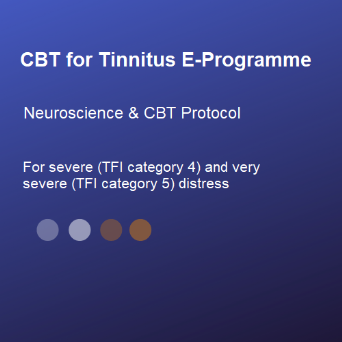Overview
Tinnitus is the term used for noises heard in the ears and or head, and for many people, it can be a very distressing experience. The term "tinnitus" comes from the Latin "tinnare" meaning "to ring", however tinnitus noises can very widely, such as ringing, hissing, buzzing, crickets - examples are many. Here is a recording of some tinnitus sounds - if you have sensitive hearing, please ensure that the volume level on your computer is set at a comfortable level for you.
Listen to synthesised examples of tinnitus sounds
Some 1 in 8 people have tinnitus. The research tells us habituation (naturalising to the noise) with little if any clinical intervention happens for 85%. For around 15% of those who have tinnitus, it is distressing. The impact tinnitus has on an individual's daily life is assessed through validated clinical measures - such as the TFI (Tinnitus Functional Index).
Using the protocol in the CBT for Tinnitus E-Programme reduces that impact, and is measurable through using the TFI (Tinnitus Functional Index). Additional measures are used when enrolling on the CBT for Tinnitus E-Programme: the Tinnitus Handicap Inventory (used as a secondary impact of tinnitus measure), along with Anxiety and Stress measures. They are used at the outset, mid-term through the process and again at the end.
Listen to synthesised examples of tinnitus sounds
Some 1 in 8 people have tinnitus. The research tells us habituation (naturalising to the noise) with little if any clinical intervention happens for 85%. For around 15% of those who have tinnitus, it is distressing. The impact tinnitus has on an individual's daily life is assessed through validated clinical measures - such as the TFI (Tinnitus Functional Index).
Using the protocol in the CBT for Tinnitus E-Programme reduces that impact, and is measurable through using the TFI (Tinnitus Functional Index). Additional measures are used when enrolling on the CBT for Tinnitus E-Programme: the Tinnitus Handicap Inventory (used as a secondary impact of tinnitus measure), along with Anxiety and Stress measures. They are used at the outset, mid-term through the process and again at the end.
Finding a CBT qualified experienced clinician to help you manage tinnitus distress effectively using CBT is difficult because so few clinicians have the knowledge and qualifications to do it, be they psychologists, psychotherapists, audiologists or hearing therapists. This problem is acknowledged in the NICE guidelines for tinnitus.
Services in the NHS are patchy where standard tinnitus treatment is carried out in Audiology Departments. Standard treatment should include fitting hearing aids when there is a hearing loss and giving some helpful advice and support to patients. It is, however, less common to find structured tinnitus management available as standard, let alone Cognitive Behaviour Therapy delivered by a qualified psychologist or psychotherapist also knowledgeable and experienced in the field of hearing and tinnitus.
I worked as an NHS Hearing Therapist from 1993 until 2010, from 2001-2010, as the Hearing Therapy Clinical Lead for East Lancashire NHS Trust. My specialism and main interest throughout has been in tinnitus management, and had to undertake additional formal education and training in the form of a PGDip in Psychotherapy (completed in 2005) that included training in Cognitive Behaviour Therapy, followed by a Masters degree in Psychotherapy (completed 2012).
From 2010 to 2019 I continued to work with tinnitus patients as part of my private psychotherapy practice. The online Tinnitus E-Programme was launched in 2009 as a self-directed, free to access six module course of tinnitus management; it subsequently became therapist-supported in 2018 after persistent high attrition (drop-out) which is common to all self-help interventions. My decision was between either making it therapist-supported or closing the E-Programme down altogether, based not only on my own findings but those of the independent evaluation carried out by NHBRC.
I have 30 years experience working with people who have tinnitus - ranging from those who simply need some reassurance through to those who are not only severely distressed by tinnitus, but also have additional problems - some hearing related such as hyperacusis (over-sensitivity to noise), vestibular problems (dizziness) and hearing loss - but also severe anxiety and/or depression as a result of tinnitus or when anxiety and depression pre-dates tinnitus onset.
I have been able to bring my knowledge, skills and experience as a Hearing Therapist together with those of also being a Psychotherapist.
Next: The Tinnitus Mechanism
